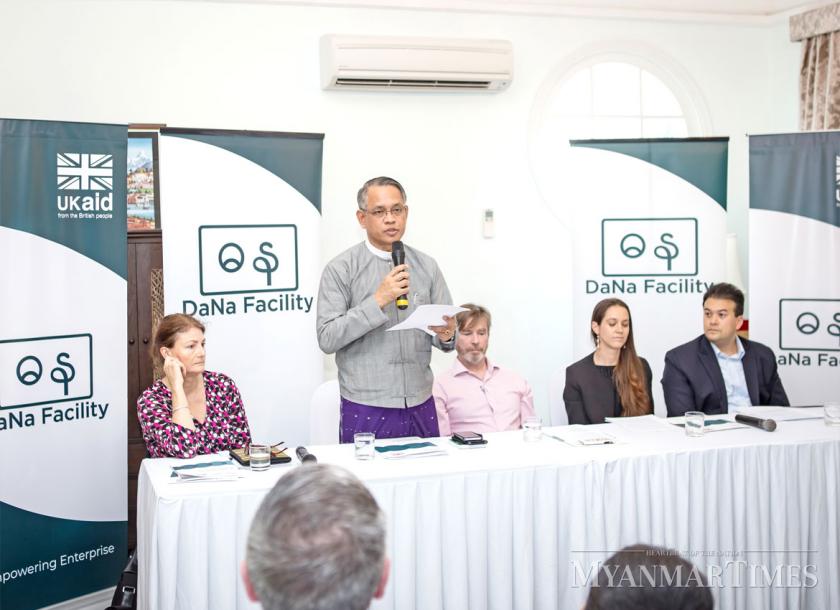UK’s Department of International Development (DFID) will invest around USD $ 2 million on a development scheme targeting small businesses in Myanmar
16 พฤศจิกายน 2561
The UK’s Department for International Development (DFID) will invest around US$2 million to help Myanmar develop a platform to finance small businesses, reducing the inequalities between SMEs and larger players.
The DaNa Facility, a DFID-funded programme, will invest over $1.9 million in the “Shwe Lan” project which aims to initially provide access to working capital for 300 micro, small and medium-sized enterprises (MSMEs) in the country which employ the poor and women, with at least 30pc of those businesses, i.e. 90 companies, female-owned. The project will be managed by Swiss-based Seedstars and Myanmar firm Thura Swiss.
Myanmar’s small businesses have little access to financing and suffered as a result. Banks normally only lend against real estate as collateral and MSMEs are virtually excluded from the credit market. This lack of finance suffocates the growth of enterprises which support a large part of the population, including the poor, women and other marginalised groups.
Shwe Lan will offer supply chain financing to MSMEs in two stages. In the first phase, it will provide businesses with access to finance by introducing a “merchant financing” product, targeting MSMEs that act as distributors of the larger companies operating across the country. In the second phase, it will provide an “invoice discounting” product where MSMEs are able to use confirmed orders as collateral for loans.
The UK’s Department for International Development (DFID) will invest around US$2 million to help Myanmar develop a platform to finance small businesses, reducing the inequalities between SMEs and larger players.
The DaNa Facility, a DFID-funded programme, will invest over $1.9 million in the “Shwe Lan” project which aims to initially provide access to working capital for 300 micro, small and medium-sized enterprises (MSMEs) in the country which employ the poor and women, with at least 30pc of those businesses, i.e. 90 companies, female-owned. The project will be managed by Swiss-based Seedstars and Myanmar firm Thura Swiss.
Myanmar’s small businesses have little access to financing and suffered as a result. Banks normally only lend against real estate as collateral and MSMEs are virtually excluded from the credit market. This lack of finance suffocates the growth of enterprises which support a large part of the population, including the poor, women and other marginalised groups.
Shwe Lan will offer supply chain financing to MSMEs in two stages. In the first phase, it will provide businesses with access to finance by introducing a “merchant financing” product, targeting MSMEs that act as distributors of the larger companies operating across the country. In the second phase, it will provide an “invoice discounting” product where MSMEs are able to use confirmed orders as collateral for loans.
Apart from facilitating MSMEs to grow and create jobs, the project will promote reform of the financial sector. Using merchant financing and invoicing factoring will allow those businesses to access credit for the first time. This leads to innovative practices being introduced to the market which can benefit the broader financial industry. When those benefits are demonstrated, Myanmar financial institutions are expected to use it to disburse their own capital and substantially scale up the availability of funding sources.
In the long-term, the aim is to promote equitable development and develop a supply chain financing market as an open e-platform for relevant companies in Myanmar. Supply chain financing directly alleviates the strain on the cash flow of a business, allowing companies to accept larger sales volumes and drive stronger growth.
‘Small businesses are the backbone of the economy and over 90 percent of people are employed by MSMEs in Myanmar.’ - Dr Gail Marzetti, UK’s Department for International Development (DFID)
Through a non-bank financial institution (NBFI) licence, the project can support previously underserved local MSMEs by offering fast and easy loan disbursement, with minimal documentation and collateral, according to Shwe Lan’s CEO Eleonora Castaldo.
“Our vision is to ensure that small businesses have the capital they need to serve their customers and grow their business, bringing prosperity to the country,” she added.
That said, she told The Myanmar Times that relaxing the financial sector in terms of collateral and interest rate requirements, among other restrictions, will “tremendously help the SME sector”. Small businesses in the country have unique challenges owing to their informality and uniform interest rate for the banks. The lack of bank account and record makes it difficult for them to access bank loans, while the uniform interest rate results in little incentive for the banks to lend to SME clients instead of corporate ones.
“Small businesses are the backbone of the economy and over 90 percent of people are employed by MSMEs in Myanmar,” DFID’s Dr Gail Marzetti, speaking at the launch event, remarked. By increasing the availability of credit to these enterprises, DFID is looking to “transform their financing and in doing so unlock their potential to grow and thrive”. She added that “This support will mean more and better paid jobs and increased economic opportunities across the Myanmar economy and more prosperous and secure future for poor people.”
U Aung Thura, CEO of Thura Swiss, said that Shwe Lan aims to bring “an easy, innovative and scalable solution” to help Myanmar MSMEs to overcome the lack of access to finance.
The MSME supply chain financing project is the latest programme by the DaNa Facility, which supports inclusive economic growth and private sector development in Myanmar through responsible and sustainable business growth, investment and trade.
Last month, DaNa Facility and Swiss insurance technology firm StoneStep AG announced a $1.1 million investment in Myanmar’s micro-insurance sector. The aim is to reach 600,000 people in order to expand and develop the domestic insurance and risk-transfer market.
(The Myanmar Times: https://www.mmtimes.com/news/dfids-lending-scheme-targets-small-businesses-myanmar.html )











